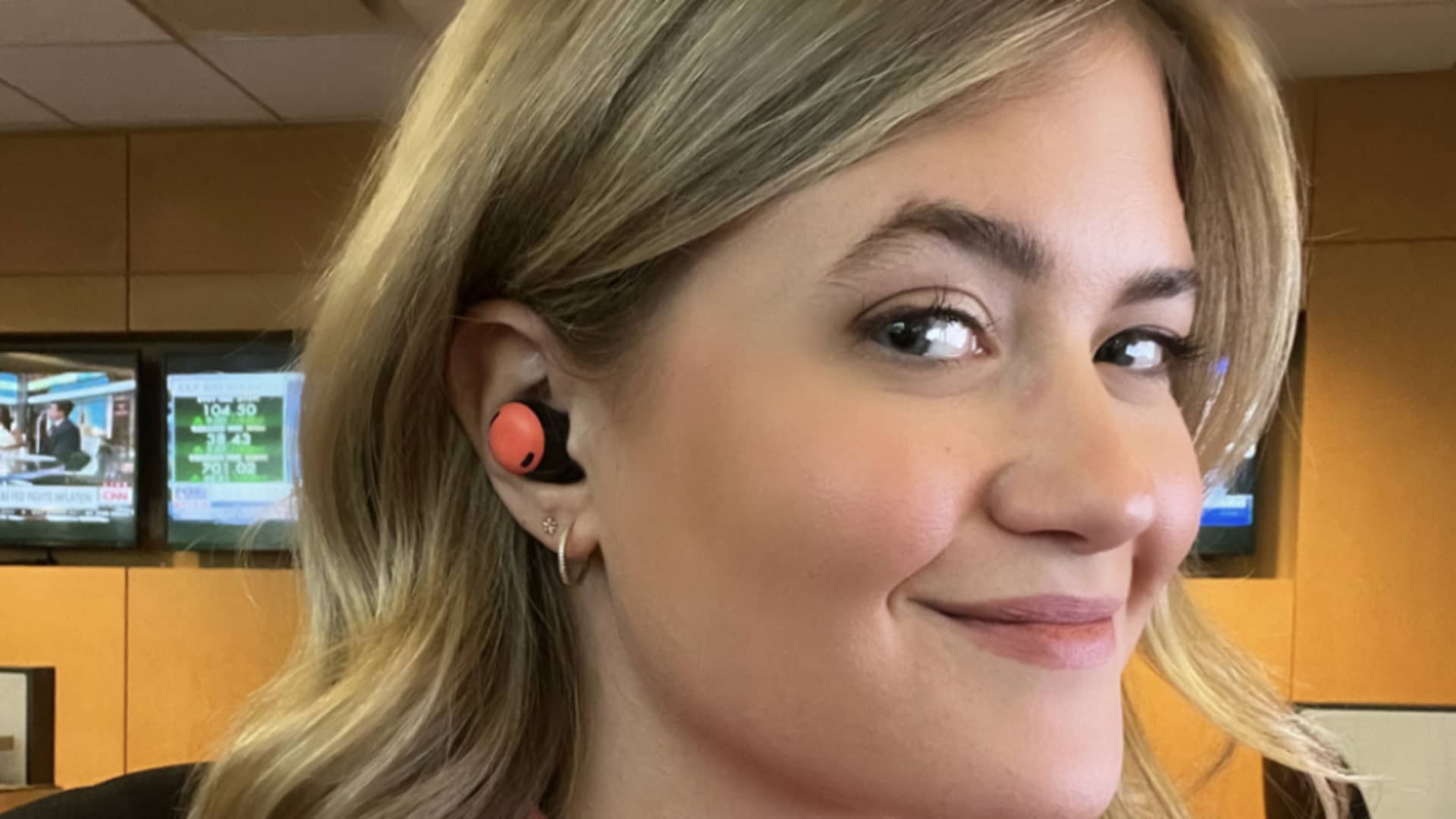Google’s new Pixel Buds Pro perform well, but they donât measure up to Appleâs AirPods Pro


Google’s new $199 Pixel Buds Pro launch in stores Thursday. I’ve been testing them for the past several days, and I think they’re a good, cheaper alternative to Apple’s $249 AirPods Pro, with some similar features, but they’re slightly inferior.
Google has been selling headphones for years and has recently leaned more into hardware with new phones that run on its own chips. But unlike Apple, which generates revenue from hardware and the services that run on it, Google is an advertising company. Hardware isn’t a big business. In the second quarter, for example, parent company Alphabet’s ad revenue accounted for $56.3 billion its $69.69 billion total.
Here’s what you need to know about the new Google Pixel Buds Pro.
What’s good
The Pixel Buds Pro are the first headphones from Google with noise-canceling technology, just like Apple’s AirPods Pro. The audio quality is first rate and almost on par with Apple’s AirPods Pro. When toggling between my AirPods Pro and Pixel Buds Pro while listening to the first minute of Billie Eilish’s “Ocean Eyes,” the bass seemed a little too loud on Google’s Buds, with the slightest hint of feedback.
The Pixel Buds Pro have an audio switching feature, which made shifting between devices like my phone, computer and tablet seamless. Aside from the initial setup, I didn’t have to go through the trouble of pairing the earbuds to each device more than once, which was convenient.
The noise cancellation is nearly as good as on the AirPods Pro. It helped block out noise so that I couldn’t hear my editor when he was asking me a question while I was listening to music. I didn’t test it on an airplane, but this noise-blocking feature is usually effective at helping to drain out the hum of engines while you’re flying. It’s why this type of headphone is popular with frequent travelers. Google said it created sensors that constantly measure the pressure in your ear canal so the buds are more comfortable and users don’t feel like their ears are clogged. I have to say that was true for me.
The earbud carrying case has a USB-C port for charging — the same as most modern Android phones use — meaning you only need to carry one cord with you. The case also supports wireless charging, just like the AirPods Pro case. That means you can just drop it on a wireless puck to charge up.
I was able to wear the Pixel Buds Pro for hours without feeling even slight ear pain, which sometimes happens when I wear my AirPods Pro. A promise of such comfort would be a welcome on long airplane rides.
They boast a longer battery life than the AirPods Pro with seven hours of listening time on one charge when noise-canceling technology is activated. When that technology isn’t activated, they last up to 11 hours. Apple’s AirPods Pro last four and a half hours on a single charge. That’s a big deal for a lot of people and, as an AirPods user, I noticed the difference.
The Pixel Buds Pro let you converse easily with someone speaking another language, thanks to a tie-in with Google translate. I tested the real-time conversation mode with my Brazilian stepmom whose first language is Portuguese.
To begin, I opened the Google Translate App on my Pixel 6a and tapped “Conversation.” After a few minutes, we were able to carry on a conversation with a near-perfect translation. I asked, “Would your family in Brazil use this translation feature?” To which my stepmom replied in Portuguese, “Yes. Is it affordable? How much does it cost?” The phone translated the conversation for me and I heard her response in English through the Pixel Buds Pro.
I probably wouldn’t use the feature to ask someone for directions, unless I was really desperate since it was slightly awkward and time consuming. But it would be useful if I was shopping overseas and needed to ask a question about whatever I was buying.
The Pixel Buds Pro come in four colors: black, coral, gray and light green. I like that the ear tips are black instead of white. (I know I’m not the only person who can get grossed out after looking at the earwax buildup on white earbuds.)
What’s bad
The Pixel Buds Pro are hypersensitive to touch. The outside surface of the buds responds if you touch it to pause a song, for example. It’s convenient if you want to just skip a music track while you’re walking. But I was listening to a podcast while resting my head on a pillow and the slightest movement of my head caused the podcast to stop. I often fall asleep with my AirPods Pro in my ears and they’ve never performed like that.
I asked Google if a software update might fix this glitch, but a spokesperson wasn’t immediately available to comment.
It’s also not as easy to find a lost set of the Pixel Buds Pro as it is with the rival AirPods. Google’s headphones have to be connected to an Android phone. But, with AirPods, the Find My app will show you the last known location, even if they’re no longer connected to your iPhone.
And the microphones weren’t that great, either. My husband said it sounded “like you’re on speaker phone” when I made a test call to him. He said he could hear me pretty well but that I sounded slightly distant.
We tried FaceTiming and video chatting on WhatsApp, too. I was frequently adjusting the Pixel Buds Pro in my ears because the fit didn’t feel as natural like my AirPods Pro does. When I fidgeted, he could hear unpleasant feedback.
There are three different rubber bud tips that come with the Pixel Buds Pro, which means there should be enough sizes to fit most people. But none of them fit me that well.
Should you buy them?
The AirPods Pro work just as seamlessly with an Android device as they do with an iOS device, so I do prefer the AirPods Pro. But, if you want to save some money, the Pixel Buds Pro are the next best thing. The battery life is great and the seamless transition when switching between devices makes the Buds Pro easy to use. The quality is almost as clear as Airpods Pro, but the clunkier design makes them feel a bit awkward.
This post has been syndicated from a third-party source. View the original article here.




